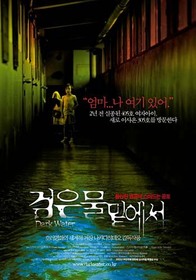Our editor-in-chief Nate Yapp is proud to have contributed to the new book Hidden Horror: A Celebration of 101 Underrated and Overlooked Fright Flicks, edited by Aaron Christensen. Another contributors include Anthony Timpone, B.J. Colangelo, Dave Alexander, Classic-Horror.com's own Robert C. Ring and John W. Bowen. Pick up a copy today from Amazon.com!
Dark Water (2002)
In a decaying, musky apartment building, the most terrible nightmares commence for Yoshimi (Hitomi Kuroki) and her five-year-old daughter Ikuko (Rio Kanno). Yoshimi is in the middle of a divorce, and is trying to gain full guardianship of her daughter. This is an extremely hard task while looking for a job and a stable place to stay; so she picks the first apartment she can find. Once they move in, bizarre things immediately start occurring.
On the elevator ride up to their apartment, Yoshimi notices a large puddle of water on the floor, caused by a trickle from the ceiling of the elevator. The management is keeping something under wraps, saying it was from a pail of water spilt. The humidity is also quite extreme in this building. Once Yoshimi and Ikuko move in, they notice a drip above the bed that gets worse by the day. Management refuses to fix the drip so Yoshimi decides to investigate the aparment above on her own. This is when the terror starts to explain itself; the true meaning of Dark Water unfolds.
Hideo Nakata is becoming a household name, taking a positive seat in the ghost story horror genre. He does for the paranormal what Lucio Fulci did for gore, or what George Romero did (does?) for zombies. The highly praised Japanese director establishes smart and moody visuals that will always be remembered in your psyche. Before you go to bed, when you turn out the lights, and in Dark Water's case, when you get in an elevator you will remember these scenes. This is Nakata's follow-up to the extremely successful Japanese horror films Ring and Ring 2. It carries a lot of similar basics of his previous entries, but takes a slower pace in order to completely design the mother/daughter character relationships. It's quite an impressive accomplishment, in terms of fright and gloom.
Dark Water is a distant cry from just being all out supernatural. The movie is layered with the struggle of a mother and her child. Everything that occurs works against Yoshimi, outwardly on purpose. During the segments of her and the lawyers, every bad thing that has ever happened to her is pointed out. Her past of seeing a psychiatrist, taking medication and being late to pick up Ikuko from school. She messes up things for herself with her reactions. Bellowing out and producing angry faces, this helps her situation in no way. Yoshimi mustn't cave in before the Father and legal representatives; it will only guide her closer to losing Ikuko. And if she loses Ikuko, she has nobody.
Dark Water essentially only has two focused characters. They are Yoshimi and her daughter Ikuko; and their communication is brilliant. Kuroki's insight of a loving mother is clear-cut. When Yoshimi is late to pick up Ikuko from school, we get first-rate flashback sequences of Yoshimi dealing with the same thing when she was a child. It's apparent from the foundation of the movie that this character is unbalanced, and is perhaps on the brink of a collapse. Her being late to pick Ikuko makes Yoshimi feel like a bad mother, and this sets off a whirlwind of anxious emotions towards the focus of the film. This is a sensational effort from Hitomi Kuroki.
Rio Kanno's ability here is astounding and credibly genuine. Hopefully, her irrefutable talent as a child actress will position her into some more solid roles in the future. She plays the part of Ikuko flawlessly, with no sense of failure anywhere to be seen. Ikuko is such an adorable child, very easy to fall in love with. Skipping everywhere she goes with the liveliest, cutest voice, yet almost like an adult at times; Kanno is outstanding. When she is sad, the camera can't help but show a sense of misery to fit her frame of mind. She completely controls her scenes in Dark Water, inventing her own sense of direction.
The terror factor here is extremely delicate, even more so than it was in Ring. Again, Nakata doesn't splatter us with masses of blood and gore; in fact none at all exists in Dark Water. There are some special FX, perhaps even more than Ring had; but they are used in a different way. For a large section of the film, the face of our ghost is hazy and unclear. This makes the element that much spookier, because trying to imagine a face behind the vague impression is creepy in it's own rite. Another instance of the subtle approach making this so frightening is a little red bag that shows up during the film. Even after Yoshimi throws this bag away it just keeps presenting itself, as if it is haunting her daughter. The surveillance camera inside the elevator has a disturbing feature of it's own, casting shadows and images only presented from the monitor. Last but not least, the water takes a big part in the film. It has a mind of it's own; and is perhaps the best element to be seen here. Respect must be rewarded to Nakata's unparalleled skill to direct beautifully, other than to FX.
Fans of the Ring series, as well as other ghost stories should try hard to get hold of this film. It's a bit slower than Nakata's Ring films, but for a good cause. The nervousness develops gradually, and the last half is nonstop, almost possessed. Dark Water is another ideal reason to turn your eyes in the direction of Asian horror; it's a totally diverse field for the genre. An excellent film, from a director with a remarkable vision.








